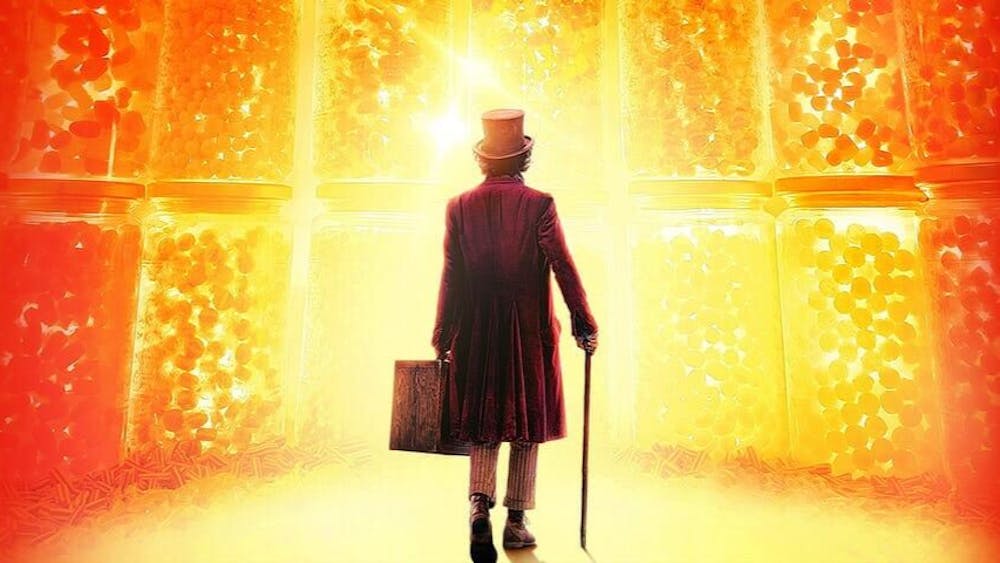Movie musicals often find themselves in a difficult position in today's cinematic landscape. While attempting to toe the line between Broadway productions and full-scale Hollywood films, most veer too far in either direction. When famous actors — such as “La La Land’s” Ryan Gosling or Emma Stone — break out into song in the middle of what would otherwise be an Oscar-worthy drama, for instance, it’s hard to take them seriously. Similarly, classics such as “Mamma Mia!” and “Hairspray” were made for the stage, and the effect is simply not the same when watching them play out on a big screen.
“Wonka,” by contrast, finds the proper balance needed to bypass the most common pitfalls of the genre. With decent singing, fantastical sets and a diverse soundtrack, the film is confident in its existence as both a musical and a movie.
“Wonka” takes fans of Roald Dahl’s “Charlie and the Chocolate Factory” back to Willy Wonka’s origin. The film follows Wonka (Timothée Chalamet) as he moves to a whimsical European city in hopes of becoming the area’s next successful chocolatier. But, after spending his entire savings in only one day, he finds himself at the mercy of Mrs. Scrubitt (Olivia Colman), a boarding house manager who swindles optimistic, naive people like him into near life-long service and exorbitant amounts of debt. To regain his freedom, Wonka hatches a plan — he will sell his chocolate, enlisting the help of an orphan named Noodle (Calah Lane) and several other of Mrs. Scrubitt’s captive guests.
Minor and major inconveniences to Wonka’s plan quickly present themselves. He is faced with an Oompa-Loompa named Lofty (Hugh Grant) who seeks compensation for the cocoa beans that Wonka inadvertently stole from his people so long ago. He also must deal with three corrupt chocolatiers who run a cartel of sorts in the city, bribing police officers with a seemingly endless supply of chocolate. While Lofty eventually becomes an ally, the chocolate cartel instead does all it can to stifle Wonka’s business, making several attempts on his life.
To complement Wonka and crew’s adventures, the film’s soundtrack is playful and varied, featuring both classics from the previous “Charlie and the Chocolate Factory” movies along with new, original additions. From optimistic and upbeat songs such as the film’s opener — “A Hatful of Dreams” — to slightly slower and more touching tracks like “For a Moment” and “Sorry, Noodle,” Wonka’s music has many pleasant surprises in store, just like his chocolate.
A large part of “Wonka’s” success as a movie musical is thanks to Timothée Chalamet’s lively portrayal of the up-and-coming chocolatier. Chalamet proves himself as an actor who can not only sing but dance reasonably well — at least in a film. While his character is a fundamentally silly one, other members of the cast back him up with more comedic relief. Mrs. Scrubitt falls in love with her henchman Bleacher (Tom Davis), and some of the chocolatiers are not the sharpest tools in the factory. Not much needs to be said about Hugh Grant’s performance as an Oompa Loompa — which is nothing less than fantastic.
The sets of “Wonka” are perfectly absurd and fantastical, featuring everything from a giraffe galloping through the city’s streets to Wonka and Noodle traversing the night sky via balloons. The city itself is imbued with a storybook quality, with quaint storefronts and an always-crowded town center. Being from the same producers as the Harry Potter film series, the movie contains a similar sense of childlike wonder and magic — constructing scenery that even adults may find themselves drawn to.
Though It’s hard to imagine how the story may have played out on a stage, where audience members are constantly reminded of the temporality of sets, scenes and the show itself, as a movie musical, “Wonka” offers a full exit from reality, accompanied by a complete entry into a world of pure imagination.

Rya is an Arts & Culture editor from Albany, NY. She is a senior studying English and Literary Arts, and her favorite TV show is Breaking Bad.





